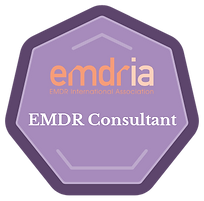


Virtual EMDR Group Intensive for Therapists
This is a unique EMDR Therapy Group for therapists who are actively managing "ongoing traumatic distress" as a part of their day-to-day professional work. This group follows a specialized group protocol (EMDR INTEGRATIVE GROUP TREATMENT PROTOCOL FOR ONGOING TRAUMATIC STRESS-REMOTE (IGTP-OTS-R) using EMDR therapy to treat ongoing, unprocessed traumatic events related to your career in the mental health field.
The persistent nature traumatic exposure in the workplace pile up and is hard on your nervous system and can ultimately lead to burn out, compassion fatigue and other negative health consequences such as clinical disorders if not managed effectively.
Value of the Group
-
Decrease negative impact of ongoing stress exposure
-
Increase day-to-day work and personal functioning
-
Increase coping and self-regulation skills
-
Research shows clinically significant results using the EMDR Group Treatment Protocol for Ongoing Traumatic Distress
-
Belong to a community of people who are in a similar circumstance
-
Learn to better regulate your nervous system when you think about or are experiencing a stressful event
-
Change negative thoughts, emotions and physical reactions connected to ongoing stressors
-
Build self-confidence and feel empowered
-
You don't have to talk and "share" or hear other trauma stories also preserving confidentiality and privacy and minimization of secondary exposure to trauma
-
Receive support for vicarious trauma
-
Prevent career burnout and compassion fatigue allowing for optimal functioning at the workplace
-
Opportunity for deep, reflective, focused work
-
We will be offering this group on an ongoing basis and you only have to do the intake once.
-
Gain hope for the future
Am I in Ongoing Traumatic Distress?
Remember, part of your reaction to traumatic experiences is based on your subjective emotional and psychological assessment of the situation and the "meaning" you assign to it. Also factoring into this is your perception of your ability to cope. This will determine the intensity of your reaction and how deeply it negatively impacts different areas of your life. It also determines how your nervous system will react in terms of fight-flight-freeze or collapse/complete shutdown. In real life this can look like severe anxiety to feeling numb/empty, or very depressed and fatigued.
Even if you've never recognized yourself to be in a traumatic environment in your workplace, or that you are being affected by negative or traumatic experiences that happen everyday, it wouldn't be a stretch to imply that facing challenging, or stressful experiences on an ongoing basis as a mental heath professional would take a negative toll on your brain and body.
It's good to reassess this from time to time and if needed intervene. Ask yourself, " have I just gotten used to this? "Can I go on like this?" "Is the impact of the stress interfering with my career goals?" "Is the ongoing stress interfering in my relationship with my loved ones?", "Is it leading me down the path of burnout?". That's where our group comes in it can be a solution to your developing problem and support you to turn things around.
Nature of Ongoing Distress:
When people are in ongoing distress the theory is they haven't had a "resting period" when the typical integration of memories would naturally attempt to occur. You typically live with a dysregulated nervous system and it impedes your ability to reflect, focus, and have a sense of safety and security. Traumatic experiences are often unable to be mentally, emotionally and physically integrated by humans without conscious effort such as reprocessing with therapy of some kind. Overtime people may not be able to pinpoint where to start in therapy because there are multiple incidents that have stacked on top of each other and it feels like there is no beginning, middle, or end. However, because of the ongoing nature of your distress it will also be about "managing" your symptoms and increasing coping skills especially so they don't rise to clinical levels.
There are many examples of experiences that put people in ongoing distress and can compound the stress you experience in the workplace that may not have any relation to the job itself Eg: sexism, racism, ableism. However, the focus of this group is on the work place in the career of mental health professionals.
EMDR Groups & Intensives Research
At the very least you will learn some coping skills that you can apply to your life. At the best you will process trauma and start feeling more optimistic about your future and feel more like yourself again. Research shows a multitude of benefits post-group with long-term positive effects such as a shift in perspective and prioritizing your ongoing mental health needs.


About the Group
This group is for therapists who work in the mental health field where ongoing distress is inherent. Due to the nature of our work we are at-risk for the development of our own clinical issues. Often upsetting work place experiences go unprocessed and pile up quickly. We often sense we need support but don’t always prioritize ourselves.
Even the group facilitators fit into this classification as we work with trauma on a regular basis as well making the process feel more credible and give a feeling that you are "in the right place" and right hands. This puts a commonality and generally community "feel" to the group.
Another thing that makes this group different is that this is not a typical "talking" support group. Members face their traumas and heal together without having to "share" and expose members to experiencing vicarious trauma by hearing others stories. In this group people will be working on their own individual silent internal process among a group of people while the facilitators give directions and guide you through the process. This technique is called "blind to therapist" meaning you can do EMDR processing without the therapist-or in this case includes other group members knowing your "target".
The intensive format for the ongoing distress group protocol is shown to draw the best clinical results. Our group will have three 45 minute processing sessions each day for a total of six targets. Participants will also be lead through grounding and self regulation therapeutic exercises before processing begins and to close sessions.
Overall the group is very structured and will move at a steady pace with a lot of repetition being that it is a structured protocol. Participants will get in a groove and begin to rely on the consistency of the EMDR protocol and feel grounded in the routine.
Registration Details
-
Use contact form or Tara or Wades email to inquire about the group
-
Facilitator will contact you for a short group readiness screening and then book individual intake if determined the group is a fit for you at this time
-
Once registered you will receive an invoice for the group
-
Once you have paid for the group you will receive an EMDR Intensive Virtual Group Manual to help "front load" you to prepare for the group
-
After the group you will complete an evaluation and receive a free Bonus eBook with self-regulation resources that use with bilateral stimulation (BLS) to support ongoing stability
Virtual EMDR Intensive Group Dates
September 27 & 28, 2025 (Sat & Sun) 11am-4pm
Group Facilitators: Tara & Wade
Tara is an RCC, Certified EMDR Therapist, Approved EMDR Consultant and EMDR Credit Provider. Tara has received specialized training to facilitate EMDR Group Protocol and has been practicing EMDR for for 9 years.
Wade is a Registered Clinical Counsellor/ Approved Clinical Supervisor, Canadian Certified Counsellor, Registered Marriage and Family Therapist and EMDR Consultant In-training. He has an MN in Advanced Nursing Practice and an MA Counselling Psychology. He runs his own online counselling private practice in Kamloops BC. and has a long and rich career in the mental health field.
Tara and Wade are joined in their passion to help professionals overcome trauma so they can get back to being the person and professional they are meant to be and have a thriving personal and professional life. They are both very excited about facilitating this powerful group.
Cancellation/Refunds
We understand that unforeseen events occur at times. We offer the following cancellation policy:
Cancelling 14 days or more prior to the start of a training
(Before Sept 13, 2025):
-
Refund: Full refund will be processed, minus a $150 administrative fee
or
-
Transfer: Full payment will be transferred to a future online group. You may transfer your payment to another online group one time.
Cancelling after 14 days prior to the start of a training Sept 13, 2025):
-
Refund: No refund
-
Transfers: No transfers to another online group
-
No Show attendance to the individual groups: no refunds available
The facilitators have the right to cancel or reschedule the online EMDR therapy group. If we need to cancel or reschedule the group, you will have the option to either receive a full refund or transfer the full online group fee to another available group.
Kindred Counselling is located at:
Boundary View Plaza
The Enterprise Centre, Suite 201 3701 E Hastings St, Burnaby, BC
T: 604-637-2074


